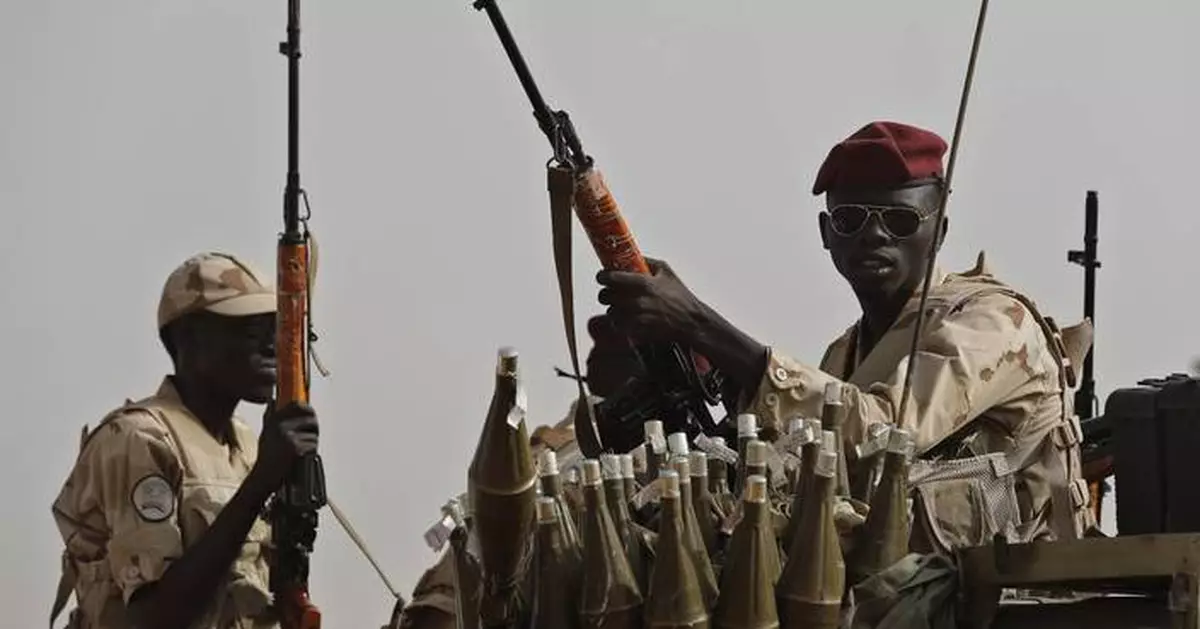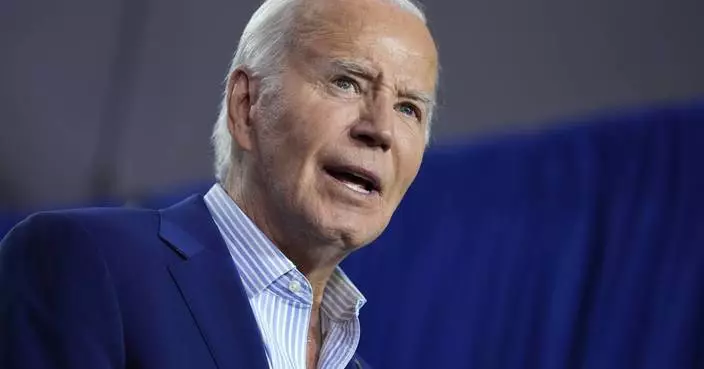CAIRO (AP) — Human rights experts working for the United Nations on Wednesday accused Sudan’s warring parties of using starvation as a war weapon, amid mounting warnings about imminent famine in the African nation.
Sudan plunged into chaos in April last year when simmering tensions between the country’s military and a notorious paramilitary group, the Rapid Support Forces, exploded into open fighting in the capital, Khartoum and elsewhere in the country.
Fourteen months of fighting have killed more than 14,000 people and wounded 33,000 others, according to the United Nations, but rights activists say the toll could be much higher.
There were widespread reports of rampant sexual violence and other atrocities that rights groups say amount to war crimes and crimes against humanity. The conflict created the world’s largest displacement crisis with over 11 million people forced to flee their homes.
“Both the SAF and the RSF are using food as a weapon and starving civilians,” the experts said, using initials for the Sudanese Armed Forces and the Rapid Support Forces. “The extent of hunger and displacement we see in Sudan today is unprecedented and never witnessed before,” they said.
Neither the military nor the RSF returned phone calls seeking comment.
The experts warned that famine has become imminent in the country as humanitarian aid has been blocked and harvest season was disrupted because of the war. They added that more than 25 million civilians in Sudan and those who fled the country are being starved and need urgent humanitarian assistance.
A report by Clingendael Institute said last month that around 2.5 million people in Sudan could die from hunger by the end of September, with about 15% of the population in the regions of Darfur and Kordofan being likely the worst affected.
The independent experts said local efforts in response to Sudan's hunger crisis have been hampered by unprecedented violence and targeted attacks on civil society and local responders. Dozens of activists and local volunteers have been arrested, threatened and prosecuted in recent weeks, they said.
“The deliberate targeting of humanitarian workers and local volunteers has undermined aid operations, putting millions of people at further risk of starvation,” they said. “Local responders are risking their health and lives and working across battle lines.”
They urged both sides to “stop blocking, looting and exploiting humanitarian assistance.”
The experts are part of the Special Procedures, which is the largest body of independent experts in the United Nations Human Rights system.
The fighting has in recent months centered around el-Fasher, the capital city of North Darfur province, trapping hundreds of thousands of civilians. At least 143,000 people have been forced to flee el-Fasher over the past three months, according to the U.N.
The U.N.’s Security Council earlier this month demanded the RSF to immediately end its siege of the city, which is the military’s last stronghold in the sprawling Darfur region.
Follow AP’s Africa coverage at: https://apnews.com/hub/africa
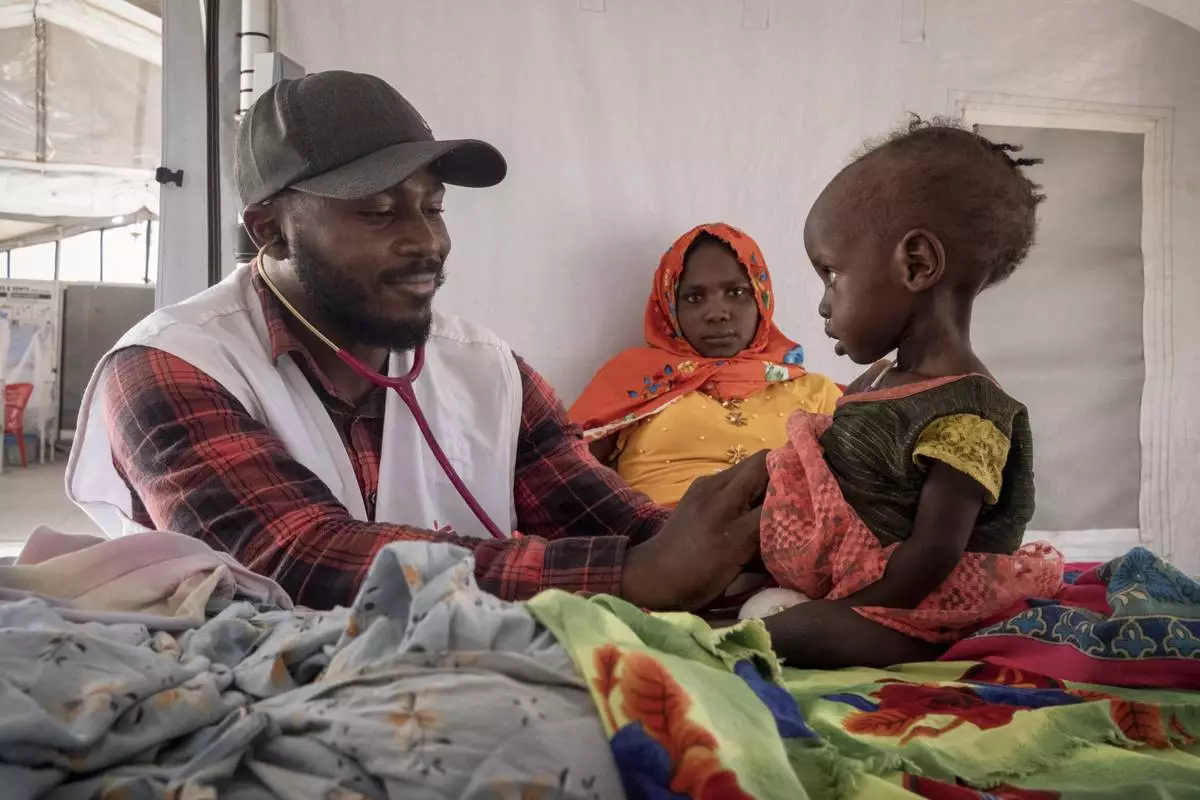
FILE - Sudanese Children suffering from malnutrition are treated at an MSF clinic in Metche Camp, Chad, near the Sudanese border, on April 6, 2024. Human rights experts working for the United Nations, Wednesday June 26, 2024 accused Sudan’s warring parties of using starvation as a war weapon, amid mounting warnings about imminent famine in the African nation. Sudan plunged into chaos in April last year when simmering tensions between the country’s military and a notorious paramilitary group, the Rapid Support Forces, exploded into open fighting in the capital, Khartoum and elsewhere in the country. (AP Photo/Patricia Simon, File)
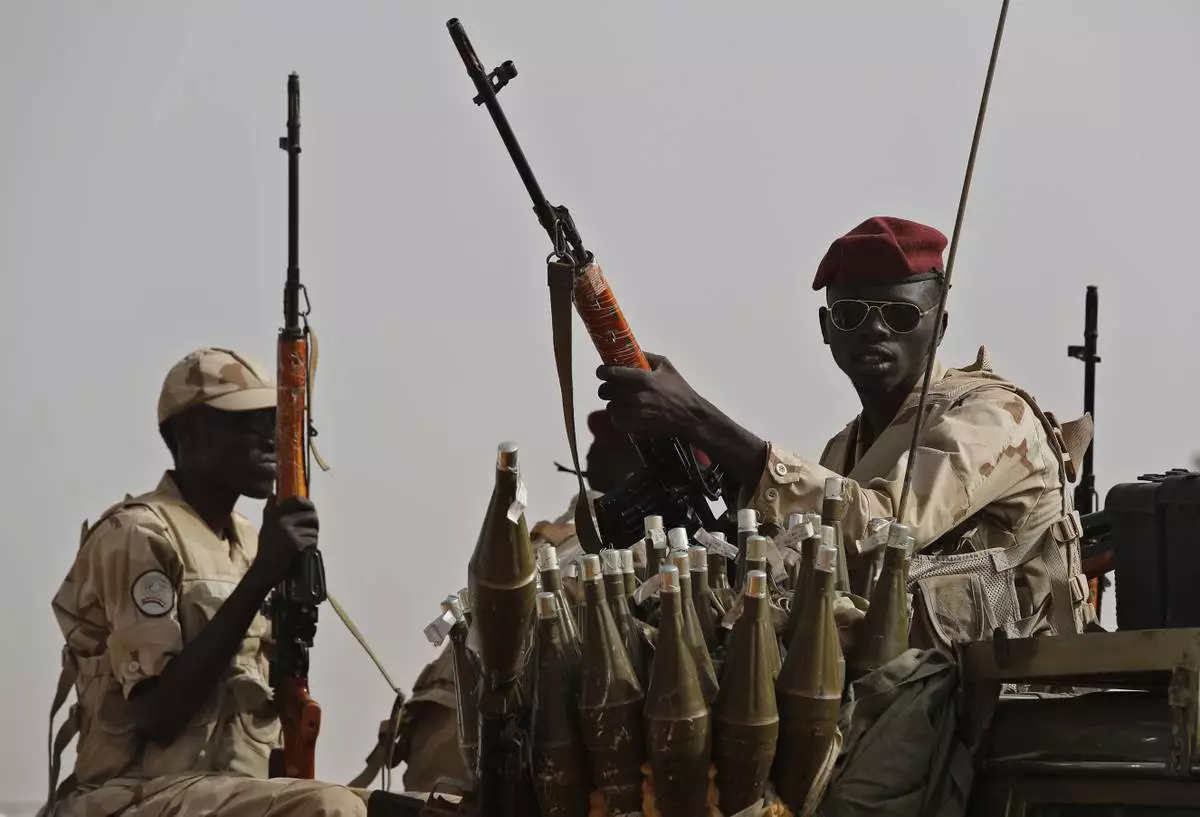
FILE - Sudanese soldiers from the Rapid Support Forces unit, led by Gen. Mohammed Hamdan Dagalo, the deputy head of the military council, secure the area where Dagalo attends a military-backed tribe's rally, in the East Nile province, Sudan, on June 22, 2019. Human rights experts working for the United Nations on Wednesday, June 26, 2024 accused Sudan’s warring parties of using starvation as a war weapon, amid mounting warnings about imminent famine in the African nation. Sudan plunged into chaos in April last year when simmering tensions between the country’s military and a notorious paramilitary group, the Rapid Support Forces, exploded into open fighting in the capital, Khartoum and elsewhere in the country. (AP Photo/Hussein Malla, File)
WASHINGTON (AP) — U.S., European and Arab mediators are pressing to keep stepped-up cross-border attacks between Israel and Lebanon's Iran-backed Hezbollah militants from spiraling into a wider Middle East war that the world has feared for months. Iran and Israel traded threats Saturday of what Iran said would be an “obliterating” war over Hezbollah.
Hopes are lagging for a cease-fire in Israel's conflict with Hamas in Gaza that would calm attacks by Hezbollah and other Iranian-allied militias. With the stalled talks in mind, American and European diplomats and other officials are delivering warnings to Hezbollah — which is far stronger than Hamas but seen as overconfident — about taking on the military might of Israel, current and former diplomats say.
The Americans and Europeans are warning the group it should not count on the United States or anyone else being able to hold off Israeli leaders if they decide to execute battle-ready plans for an offensive into Lebanon. And Hezbollah should not count on its fighters' ability to handle whatever would come next.
On both sides of the Lebanese border, escalating strikes between Israel and Hezbollah, one of the region's best-armed fighting forces, appeared at least to level off this week. While daily strikes still pound the border area, the slight shift offered hope of easing immediate fears, which had prompted the U.S. to send an amphibious assault ship with a Marine expeditionary force to join other warships in the area in hopes of deterring a wider conflict.
Despite this past week's plateauing of hostilities, said Gerald Feierstein, a former senior U.S. diplomat in the Middle East,“ it certainly seems the Israelis are still ... arranging themselves in the expectation that there will be some kind of conflict ... an entirely different magnitude of conflict."
The message being delivered to Hezbollah is “don't think that you're as capable as you think you are,” he said.
Beginning the day after Hamas' Oct. 7 attacks on Israel triggered the war in Gaza, Hezbollah has launched rockets into northern Israel and vowed to continue until a cease-fire takes hold. Israel has hit back, with the violence forcing tens of thousands of civilians from the border in both countries. Attacks intensified this month after Israel killed a top Hezbollah commander and Hezbollah responded with some of its biggest missile barrages.
U.N. humanitarian chief Martin Griffiths used the word “apocalyptic” to describe a war that could result. Both Israel and Hezbollah, the dominant force in politically fractured Lebanon, have the power to cause heavy casualties.
“Such a war would be a catastrophe for Lebanon," Defense Secretary Lloyd Austin said as he met recently with Israeli Defense Minister Yoav Gallant at the Pentagon. “Another war between Israel and Hezbollah could easily become a regional war, with terrible consequences for the Middle East.”
Gallant, in response, said, “We are working closely together to achieve an agreement, but we must also discuss readiness on every possible scenario.”
Analysts expect other Iran-allied militias in the region would respond far more forcefully than they have for Hamas, and some experts warn of ideologically motivated militants streaming into the region to join in. Europeans fear destabilizing refugee flows.
And if it looks like any Israeli offensive in Lebanon is "going seriously south for the Israelis, the U.S. will intervene,” Feierstein said. “I don’t think that they would see any alternative to that.”
While Iran, which is preoccupied with a political transition at home, shows no sign of wanting a war now, it sees Hezbollah as its strategically vital partner in the region — much more so than Hamas — and could be drawn in.
Upping tensions, Iran's U.N. mission said in a posting Saturday on X that an “obliterating” war would ensue if Israel launches a full-scale attack in Lebanon. Israeli Foreign Minister Israel Katz responded by pledging his country would move against Hezbollah with “full force” unless it stopped attacks.
While the U.S. helped Israel knock down a barrage of Iranian missiles and drones in April, the U.S. likely would not do as well assisting Israel's defense against any broader Hezbollah attacks, said Gen. CQ Brown, chairman of the Joint Chiefs of Staff. It is harder to fend off the shorter-range rockets that Hezbollah fires routinely across the border, he said.
The Israeli army is stretched after a nearly 9-month war in Gaza, and Hezbollah holds an estimated arsenal of some 150,000 rockets and missiles capable of striking anywhere in Israel. Israeli leaders, meanwhile, have pledged to unleash Gaza-like scenes of devastation on Lebanon if a full-blown war erupts.
White House senior adviser Amos Hochstein, President Joe Biden's point person on Israel-Hezbollah tensions, has not been successful so far in getting the two sides to dial back the attacks.
The French, who have ties as Lebanon's former colonial power, and other Europeans also are mediating, along with the Qataris and Egyptians.
White House officials have blamed Hezbollah for escalating tensions and said it backs Israel’s right to defend itself. The Biden administration also has told the Israelis that opening a second front is not in their interest. That was a point hammered home to Gallant during his latest talks in Washington with Secretary of State Antony Blinken, Austin, CIA Director William Burns, national security adviser Jake Sullivan, Hochstein and others.
“We’re going to continue to help Israel defend itself; that’s not going to change,” White House national security spokesman John Kirby said. “But as for a hypothetical — specifically with respect to the northern border line ... — again, we want to see no second front opened, and we want to see if we can’t resolve the tensions out there through diplomatic processes.”
White House officials, however, are not discounting the real possibility that a second front in the Mideast conflict could open.
In conversations with Israeli and Lebanese officials and other regional stakeholders, there is agreement that “a major escalation is not in anybody’s interest,” a senior Biden administration official said.
The official, who was not authorized to comment publicly about White House deliberations and spoke on condition of anonymity, bristled at the “purported logic” of Hezbollah leader Hassan Nasrallah arguing that Israel would see an end to Hezbollah attacks by reaching a cease-fire agreement with Hamas in Gaza.
But the official also acknowledged that an elusive cease-fire deal in Gaza would go a long way in quieting tensions on the Israel-Lebanon border.
Biden introduced a three-phase deal four weeks ago that would lead to an extended truce and the release of Israeli hostages and Palestinian prisoners, but negotiations between Israel and Hamas appear to have stalled. A senior Biden administration official said Saturday that the U.S. has presented new language to Egypt and Qatar intermediaries aimed at trying to jumpstart the negotiations. The official spoke on condition of anonymity to discuss an effort that the White House has yet to publicly unveil.
Even without a cease-fire, there's hope that if Israel wraps up its offensive in the southern Gaza city of Rafah and doesn't launch any new major offensive in Gaza, Hezbollah might ease up on firing rockets into Israel, said Randa Slim, a senior fellow at the Middle East Institute.
But without a cease-fire in Gaza, any temporary calm on the Lebanon-Israeli border “is not enough," Slim said.
Associated Press writers Abby Sewell in Beirut, Josef Federman in Jerusalem, and Matthew Lee, Tara Copp, Lolita C. Baldor and Aamer Madhani contributed to this report.
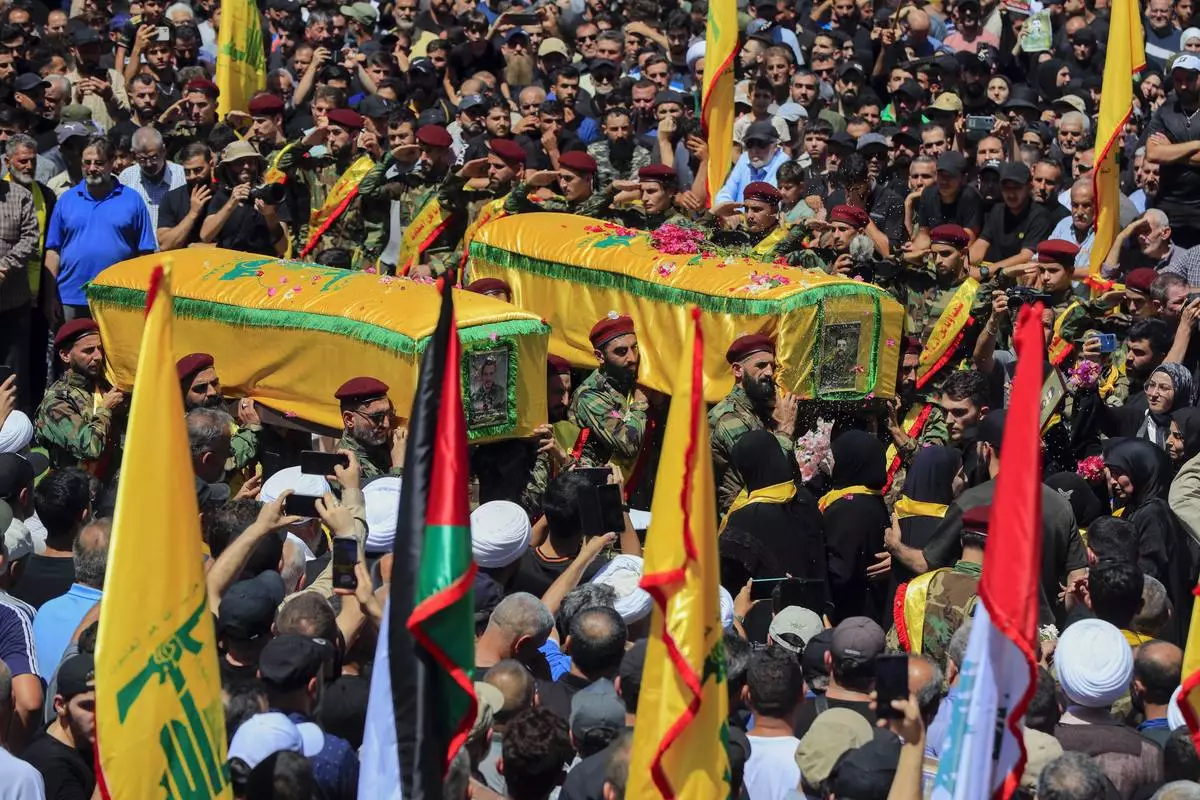
Mourners carry the coffins of Hezbollah fighters Mohammed Hussein Qassem and Abbas Ahmed Soror, who were killed by an Israeli strike, during their funeral procession in Aita al-Shaab village, south Lebanon, Saturday, June 29, 2024. (AP Photo/Mohammed Zaatari)
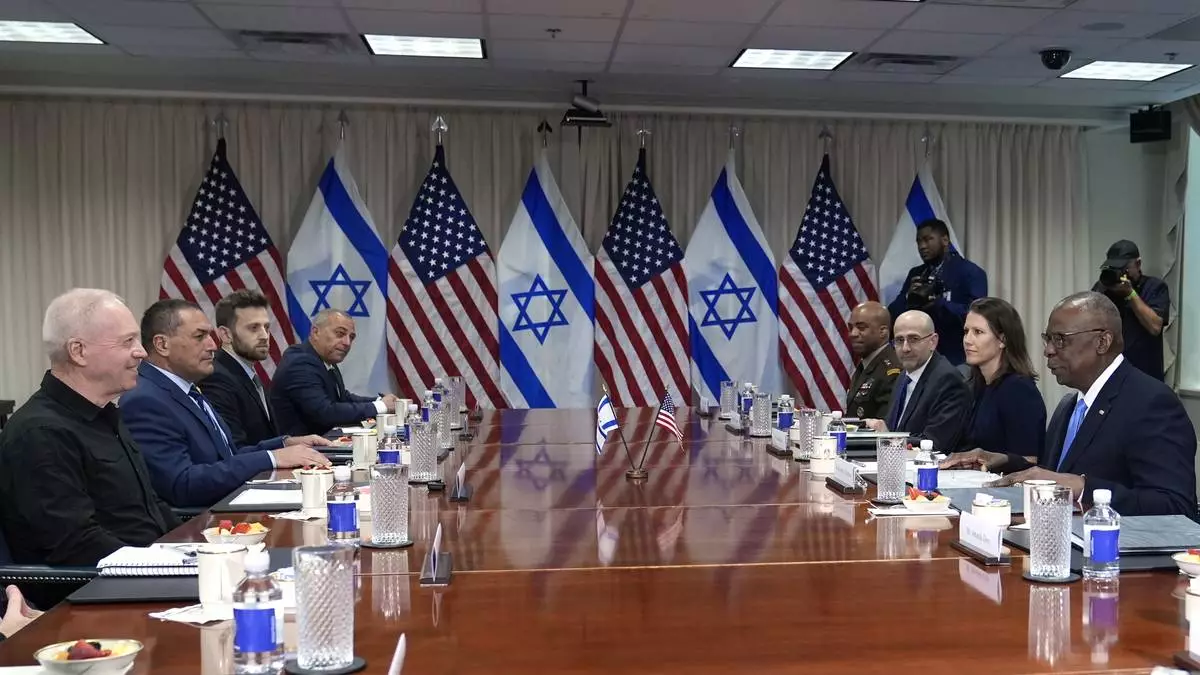
Defense Secretary Lloyd Austin, right, and Israeli Defense Minister Yoav Gallant, second from left, sit down for a meeting at the Pentagon in Washington, Tuesday, June 25, 2024. The two, who have been in weekly contact since the Hamas attack on Israel in October, are expected to discuss Israeli operations in Gaza, humanitarian efforts in the region, and tension with Hezbollah in Lebanon. (AP Photo/Susan Walsh)
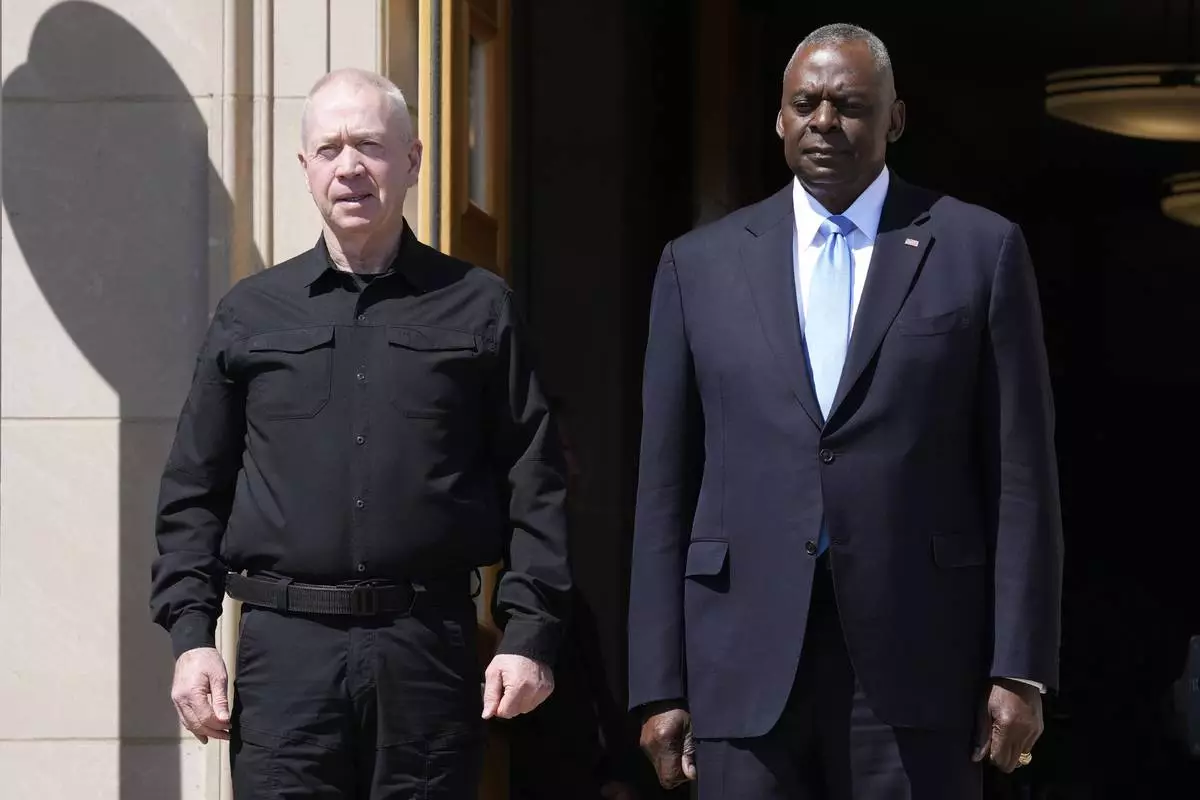
Defense Secretary Lloyd Austin, standing right, and Israeli Defense Minister Yoav Gallant, standing left, listen to the playing of the Israeli National Anthem during an arrival ceremony at the Pentagon in Washington, Tuesday, June 25, 2024. The two, who have been in weekly contact since the Hamas attack on Israel in October, are expected to discuss Israeli operations in Gaza, humanitarian efforts in the region, and tension with Hezbollah in Lebanon. (AP Photo/Susan Walsh)




